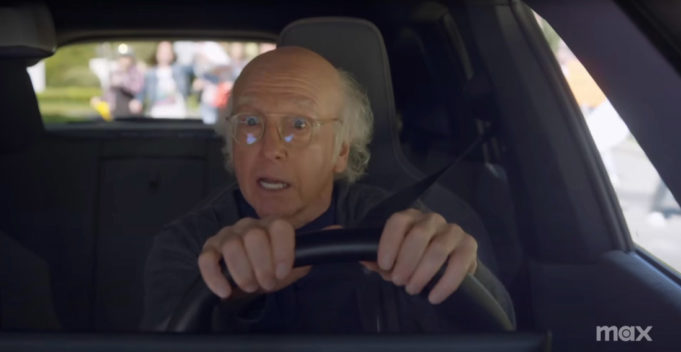If you’re a long-time HBO viewer, it’s hard not hear the carnivalesque theme to Curb Your Enthusiasm (“Frolic” by composer Luciano Michelini) directly after the network’s name materializes out of the static. Every time I hear those first three tuba notes, I immediately picture clown shoes. Curb has aired concurrently with some of the shows that harkened the age of prestige TV: The Sopranos, Deadwood, The Wire, and The Leftovers, just to name a few. It has been the constant comedic respite from not only all the network’s dramas but from polite society in general, hoisting a satirical middle finger to everyone’s rules. Now, with its 12th and final season, Curb Your Enthusiasm has just ended one of the greatest runs in television history.
The show follows creator/writer Larry David (co-creator of Seinfeld), who plays an exaggerated version of himself going about his day-to-day life. For those familiar with Seinfeld, the character of George Constanza, who was a stand-in for David, is much the same: neurotic, cantankerous, apathetic, and unwilling to bend to convention. Curb is largely improvised with only a sketch of the episodes and arc for the season, allowing the cast room to shape the narrative. There are some mainstays, such as his manager and best friend Jeff Greene (Jeff Garlin) and his foul-mouthed wife Susie Greene (Susie Essman), ex-wife Cheryl David (Cheryl Hines), roommate Leon Black (J.B. Smoove), and frenemies Richard Lewis and Ted Danson playing themselves, but each season features a rotating cast of guests and cameos. Tracey Ulman as Larry’s girlfriend Irma Kostroski and Vince Vaughn as Freddy Funkhouser (a sort of replacement for Bob Einstein’s character after the actor’s death in 2019) have been some of the better recent additions.
The premise for Season 12 revolves around Larry’s arrest for the absurd offense of giving a Georgia woman water while she waited in line to vote, satirizing the state’s draconian voter suppression laws. After this act of defiance, Larry becomes a sort of folk hero, supported by the likes of Bruce Springsteen, and then proceeds to find ways to tarnish this newfound fame in subsequent episodes. Tackling politics isn’t new to the show. Season 11 addresses Donald Trump’s infamous “perfect call” to Volodymyr Zelensky and takes direct aim at Trump apologists in an episode when Larry uses a MAGA hat to get out of trouble. David and company excel at hyperbolizing the various chinks in our lives. The bunching of corduroy pants in the crotch region that someone may worry is an erection becomes the “pants tent,” the refusal to stop and talk to someone when out and about becomes the irritating “stop and chat,” or the failing dinner party has to be saved by finding a better person to “middle” (because in the middle of the table should sit the most gregarious person). In a landscape full of shows that insist on heavy themes, you can always count on Curb to make even the most absurd parts of existence funny.
As the season progresses, Larry prepares for his court date for breaking the voter law and finds himself, as usual, in a number of self-induced kerfuffles. His ongoing war with his country club manager Takahashi (Dana Lee) escalates as the owner searches, McCarthyism-style, for the author of a letter titled “Disgruntled.” Larry also finds himself wrecking his lawyer’s life by trying to sow dissent between the lawyer (Sean Hayes) and his same-sex partner as they decide their adopted child’s surname. The precision of these micro-conundrums is where Curb shines. Poking fun at the injustices of country club life highlights Larry’s out-of-touch perspectives, and when two men adopt a child, whose last name do they use? Of course, all of these lead to the mounting turmoil of Larry’s life.
The series finale, aptly titled “No Lessons Learned,” seemed poised to repeat the last Seinfeld episode. That’s when the gang was arrested for a passive crime, and their trial became just a montage of memorable scenes. It was an episode David had returned to write after previously splitting, and the setup for “No Lessons Learned” is virtually the same. The prosecutor brings in an array of past acquaintances Larry has wronged, all but sealing his fate. After the airing of grievances is over and Larry is incarcerated, Larry David the creator is able to finagle his way into finding some redemption, righting the wrongs the Seinfeld finale made.
In the final scene of the series, Larry finds himself with the main cast on a plane ride home arguing about the rules of opening the window shade: Are they “community shades” or not? As the theme begins to play over the flaring tempers, the show ends much as it began, with Larry David going after the petty injustices of life and enraging everyone in the process.












